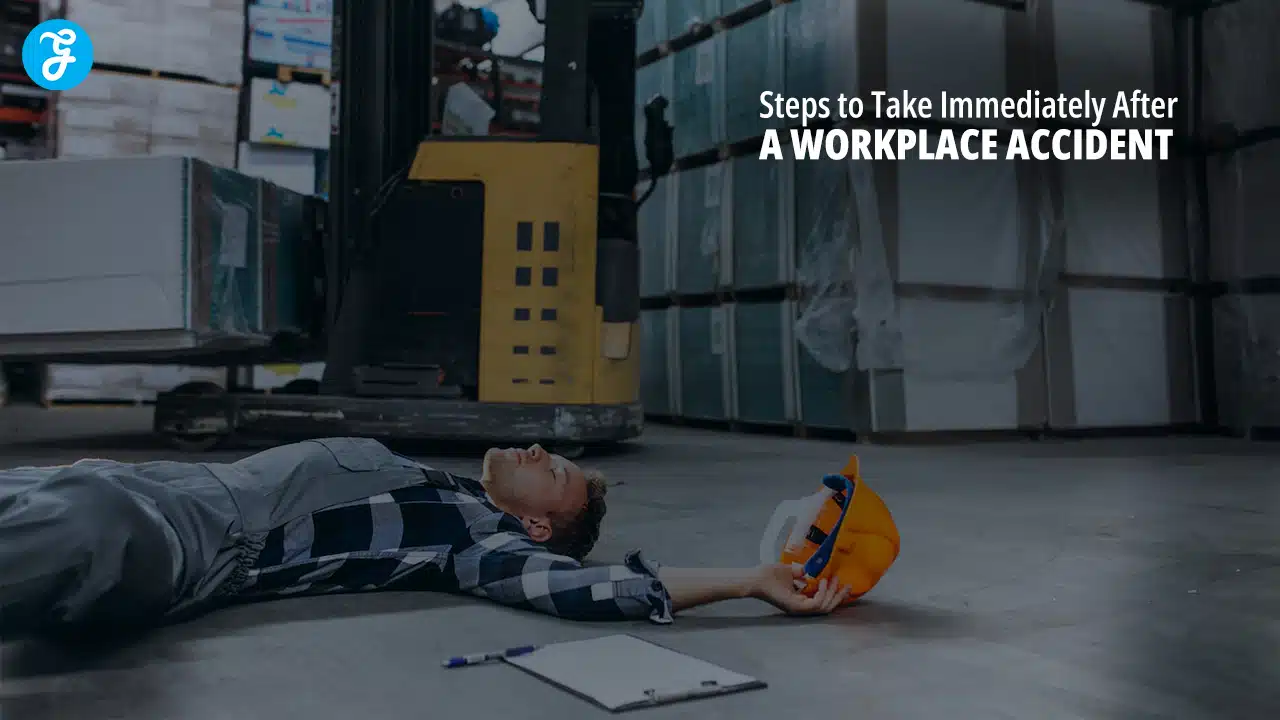Workplace accidents can happen suddenly, leaving you confused and unsure what to do next. This guide will walk you through 12 crucial steps to take right after a workplace accident. Following these steps can protect your health, rights, and potential legal claims. Whether you’re an employee or employer, knowing how to respond is key. That’s why we’ve created this comprehensive, easy-to-follow guide for you. Let’s take a look at the 12 steps to take immediately after a workplace accident.
12 Steps to Take Immediately After a Workplace Accident
Chances are you or someone you care about has faced a workplace accident. First things first: take a deep breath. You’re not alone in this. In fact, the U.S. Bureau of Labor Statistics tells us that in 2022, private industry employers reported a whopping 2.7 million nonfatal workplace injuries and illnesses. That’s a lot of people dealing with unexpected workplace mishaps! We’re going to walk you through 12 essential steps to take immediately after a workplace accident,
1. Seek Medical Attention: Your Health Comes First, Always!
Imagine you’ve just had an accident at work. Your first thought might be, “It’s not that bad, I can walk it off.” But hold up! Even if you think your injury is just a minor bump or scrape, it’s crucial to get checked out by a medical professional. Here’s why:
- Hidden injuries: Some injuries, like internal bruising or hairline fractures, might not be obvious right away. That little twinge could be a sign of something more serious.
- Documentation is key: Getting medical attention creates an official record of your injury. This can be super important if you need to file a workers’ compensation claim later.
- Speedy recovery: The sooner you get treatment, the faster you’re likely to recover and get back to your normal life.
What you need to do:
- For emergencies: If it’s serious, don’t hesitate – call 911 or head to the nearest emergency room pronto.
- For non-emergencies: Visit your company’s designated healthcare provider or your personal doctor. Just make sure to tell them it’s a work-related injury.
- Be thorough: Describe all your symptoms, even the small ones. Don’t leave anything out!
- Follow doctor’s orders: Take any prescribed medications and follow all treatment instructions to the letter.
According to a study published in the Journal of Occupational and Environmental Medicine, prompt medical attention after workplace injuries is associated with faster return to work and better overall outcomes. Don’t let concerns about medical costs deter you – workers’ compensation typically covers necessary medical treatment for work-related injuries.
The National Safety Council reports that in 2020, the total cost of work injuries was $163.9 billion, including wage and productivity losses, medical expenses, and administrative costs. This translates to $1,100 per worker and $44,000 per medically consulted injury.
Remember, Your health is your most valuable asset. Don’t let worries about work or money stop you from getting the care you need. Your future self will thank you!
2. Report the Accident: Speak Up, It’s Your Right!
Next up on our to-do list: let your employer know what happened. You might feel a bit nervous about this, especially if you think the accident was your fault. But here’s the deal: reporting the accident isn’t about playing the blame game. It’s about creating an official record and ensuring your rights are protected. Here’s why it’s so important:
- It’s the law: Many states require you to report workplace injuries within a certain timeframe, sometimes as short as 24 hours.
- It triggers the claims process: Your report is often the first step in filing a workers’ compensation claim.
- It helps prevent future accidents: By reporting, you’re helping your employer identify and fix potential safety hazards.
How to report like a pro:
- Act fast: Notify your supervisor or manager as soon as possible after the accident.
- Follow the rules: Use your company’s specific reporting procedures. If you’re not sure what they are, ask HR.
- Be detailed: Include the date, time, location, and exactly what happened. Think of yourself as a reporter getting all the facts.
- Name names: If anyone witnessed the accident, mention them in your report.
- Get it in writing: Always ask for a copy of the accident report for your own records.
A study by the National Council on Compensation Insurance found that injuries reported more than 14 days after they occur have significantly higher claim costs and longer recovery times. Specifically, claims reported between two weeks and one month after an injury were, on average, 35% more expensive than those reported within two weeks.
Pro tip: If your employer doesn’t have a formal reporting process, send an email detailing the accident. This creates a time-stamped record of your report.
3. Document Everything: Become the Sherlock Holmes of Your Case
Now it’s time to put on your detective hat. Gathering evidence might sound like something out of a TV crime show, but it’s super important in workplace accident cases. Here’s what you need to document:
- Your account: Write down everything you remember about the accident while it’s fresh in your mind. Include every detail, no matter how small it seems.
- Visual evidence: If possible, take photos or videos of the accident scene, including any hazards that contributed to the accident.
- Medical records: Keep copies of all medical reports, test results, and treatment plans.
- Expenses: Save every receipt related to your injury, from medical bills to parking fees at the doctor’s office.
- Impact on daily life: Start a journal documenting your symptoms and how the injury affects your day-to-day activities.
Why all this paperwork? If you need to file a workers’ compensation claim or take legal action, this documentation can be solid gold. It provides a clear, factual record of what happened and how it’s affected you.
According to the American Bar Association, thorough documentation can significantly strengthen a workplace injury claim. In cases where liability is disputed, this evidence can be the deciding factor in determining fault and securing appropriate compensation.
A study by the Insurance Research Council found that injury victims who gathered documented evidence received settlements that were, on average, 40% higher than those who did not collect such evidence.
4. Preserve Evidence: Don’t Touch That Dial!
Your first instinct after an accident might be to clean up the mess or fix whatever caused the problem. But hold your horses! If possible, try to leave the accident scene as is. Here’s why:
- It’s valuable evidence: The scene of the accident can provide important clues about what happened and why.
- It helps investigations: Safety investigators may need to examine the area to determine the cause of the accident.
- It protects your case: Altering the scene could potentially harm your case if legal action becomes necessary.
What to do:
- Safety first: If leaving the scene as-is poses a danger to others, take necessary safety precautions.
- Snap pics: If you must move things, take detailed photos or videos first.
- Save the evidence: Preserve any equipment or materials involved in the accident. Don’t repair or throw away anything without approval.
Remember: If in doubt, don’t touch! It’s better to err on the side of caution when it comes to preserving evidence.
5. Follow Company Procedures: Play by the Rules (Even If They Seem Boring)
Every workplace has its own set of procedures for handling accidents. Following these rules might seem like a hassle, but it’s super important. Here’s why:
- It protects your rights: Following procedures ensures you don’t accidentally forfeit any benefits or rights.
- It speeds up the process: When you follow the rules, your claim is likely to be processed more quickly.
- It shows professionalism: It demonstrates that you’re a responsible employee who respects company policies.
Steps to take:
- Read up: Familiarize yourself with your company’s accident procedures. These are often found in employee handbooks or safety manuals.
- Follow the playbook: Go through each step carefully, even if some seem unnecessary.
- Ask questions: If anything is unclear, don’t hesitate to ask your supervisor or HR for clarification.
- Keep records: Document each step you’ve taken to comply with company procedures.
Pro tip: If your company doesn’t have clear procedures, suggest that they develop some. It’s in everyone’s best interest to have a clear plan for handling workplace accidents.
6. File a Workers’ Compensation Claim: Your Safety Net
Workers’ compensation is like a safety net for employees who get hurt on the job. It’s a form of insurance that provides wage replacement and medical benefits. Here’s the lowdown:
- It’s usually mandatory: Most employers are required by law to have workers’ compensation insurance.
- It’s a no-fault system: You can receive benefits regardless of who was at fault for the accident.
- It covers a lot: Benefits typically include medical expenses, a portion of lost wages, and rehabilitation costs.
How to file a claim:
- Get the forms: Your employer should provide you with the necessary paperwork. If not, you can usually get them from your state’s workers’ compensation board.
- Fill ’em out: Complete the forms accurately and thoroughly. Any errors could delay your claim.
- Beat the clock: Submit your claim as soon as possible. There are often strict deadlines for filing.
- Keep copies: Make copies of everything you submit. You might need them later.
Remember, Filing a workers’ comp claim is your right. Your employer can’t legally fire you or retaliate against you for filing a claim.
According to the National Academy of Social Insurance, workers’ compensation programs covered an estimated 142.7 million workers in 2021, with total benefits paid reaching $63.4 billion. Understanding your rights under this system is crucial for ensuring you receive the full benefits you’re entitled to.
The U.S. Department of Labor reports that in 2021, state and federal workers’ compensation programs combined paid out approximately $69.1 billion in benefits. This includes $31.2 billion for medical care and $37.9 billion in wage replacement benefits.
7. Cooperate with Investigations: Just the Facts, Ma’am
After a workplace accident, there might be an investigation. This could be conducted by your employer, their insurance company, or even a government agency like OSHA. Here’s how to handle it like a pro:
- Be honest: Always tell the truth. Lying or exaggerating can seriously harm your case.
- Stick to the facts: Describe what happened as clearly and accurately as you can.
- Don’t speculate: If you’re not sure about something, it’s okay to say “I don’t know.”
- Know your rights: You have the right to have a representative present during formal interviews.
Why play ball?
- It helps get to the truth: Your cooperation can help ensure a fair and accurate assessment of the incident.
- It can speed things up: The more you cooperate, the faster your claim is likely to be resolved.
- It shows good faith: Your cooperation demonstrates that you’re committed to workplace safety and resolving the issue.
Pro tip: If you feel uncomfortable during an investigation or aren’t sure how to answer certain questions, consider seeking advice from a workers’ compensation attorney.
OSHA conducted 33,393 inspections in fiscal year 2022, highlighting the importance of proper accident investigation in maintaining workplace safety. Your cooperation can help identify hazards and prevent future accidents.
According to OSHA statistics, the agency issued 37,755 citations in FY 2022, with total penalties amounting to $312,501,021. The most frequently cited standards were related to fall protection, hazard communication, and respiratory protection.
8. Know Your Rights: Knowledge is Your Superpower
Understanding your rights after a workplace accident is like having a superpower. It helps you navigate the process with confidence and ensures you get the benefits you’re entitled to. Here are some key rights you should know about:
- Right to file a claim: You have the right to file a workers’ compensation claim without fear of retaliation.
- Right to medical care: You’re entitled to reasonable and necessary medical treatment for your work-related injury.
- Right to disability compensation: If you can’t work due to your injury, you may be eligible for temporary or permanent disability benefits.
- Right to return to work: Once you’re medically cleared, you have the right to return to your job in most cases.
- Right to appeal: If your claim is denied, you have the right to appeal the decision.
- Right to representation: You have the right to hire an attorney to represent you in your workers’ compensation case.
Remember: Rights can vary by state, so it’s a good idea to familiarize yourself with the specific laws in your area. Knowledge is power!
9. Consider Legal Representation: When to Call in the Cavalry
While many workplace accident claims are straightforward, sometimes you might need a legal expert in your corner. Here’s when you should consider talking to a workers’ compensation attorney:
- Your claim is denied
- You’re not receiving the benefits you believe you’re entitled to
- You have a pre-existing condition that complicates your claim
- You’re facing retaliation for filing a claim
- Your injury will prevent you from returning to your job or working at all
- Your employer disputes your claim
How a lawyer can help:
- Navigate the legal maze: Workers’ comp laws can be complex. A lawyer can guide you through the process.
- Fight for fair compensation: They can ensure you receive all the benefits you’re entitled to.
- Represent you in hearings: If your case goes to a hearing, a lawyer can present your case effectively.
- Negotiate settlements: They can negotiate with insurance companies on your behalf.
- Protect your rights: A lawyer can make sure your rights are respected throughout the process.
Pro tip: Many workers’ compensation attorneys offer free initial consultations. This means you can get expert advice without any upfront costs.
According to the American Bar Association, workers with legal representation in workers’ compensation cases tend to receive larger settlements and are more likely to have their claims approved compared to those without representation.
A study by Martindale-Nolo Research found that workers who hired lawyers received settlements that were, on average, 30% higher than those who didn’t have legal representation.
10. Follow Up on Your Claim: Be the Squeaky Wheel
Once you’ve filed your claim, you might think it’s time to sit back and wait. But here’s the truth: staying on top of your claim can make a big difference. Here’s why:
- Claims can get lost: Sometimes paperwork gets misplaced or overlooked in busy offices.
- Information gaps: You might need to provide additional information to move your claim forward.
- Deadlines matter: There are often strict timelines in workers’ comp cases. Following up helps ensure nothing falls through the cracks.
How to follow up like a pro:
- Keep a communication log: Note down every phone call, email, or letter related to your claim.
- Be persistent: Follow up regularly with your employer and the insurance company.
- Respond promptly: If anyone requests additional information, provide it as quickly as possible.
- Know the chain of command: If you’re not getting responses, don’t be afraid to escalate to supervisors or managers.
Remember: The squeaky wheel often gets the grease. Don’t assume someone else is taking care of things – stay proactive!
11. Focus on Recovery: Health is Your True Wealth
While dealing with paperwork and procedures is important, don’t lose sight of what really matters: your health and well-being. Here’s how to prioritize your recovery:
- Follow doctor’s orders: Take medications as prescribed and attend all follow-up appointments.
- Participate in therapy: If physical therapy or rehabilitation is recommended, give it your all.
- Listen to your body: Don’t push yourself too hard. If something hurts, stop and consult your doctor.
- Mind your mental health: Workplace accidents can be stressful. Don’t hesitate to seek counseling if you’re struggling emotionally.
- Stay active (if cleared): Light exercise, as approved by your doctor, can aid in recovery and boost your mood.
- Eat well: A healthy diet can support your body’s healing process.
Pro tip: Keep a recovery journal. Track your progress, note any setbacks, and write down questions for your doctor. This can be helpful for your medical care and your claim.
12. Plan for Return to Work: Looking Ahead with Confidence
As you recover, it’s important to start thinking about your eventual return to work. Here’s what to consider:
- Get clear guidelines: Ask your doctor for specific work restrictions or accommodations you might need.
- Communicate with your employer: Keep your boss or HR department updated on your recovery progress.
- Know your options: Consider a gradual return to work, starting with light duties or reduced hours if possible.
- Prepare for changes: Be ready to advocate for yourself if you need workplace modifications or a different role.
- Brush up on skills: If you’ve been away for a while, consider refreshing your job skills before returning.
- Stay positive: Remember, returning to work is a positive step in your recovery journey.
Remember, a successful return to work isn’t just about being physically present. It’s about being able to perform your job safely and effectively while continuing your recovery.
Takeaway
Navigating the aftermath of a workplace accident can be challenging. By following these 12 steps, you can protect your health, rights, and potential legal claims. Remember, your well-being is the top priority.
Don’t hesitate to seek help from medical professionals, your employer’s HR department, or legal experts when needed. Stay informed, document everything, and focus on your recovery. With the right approach, you can successfully manage the impact of a workplace accident and move forward positively.





































